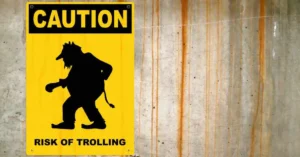Patents are an essential aspect of innovation and technology. It is the tool that gives inventors a much-deserved reward and incentive, thus playing a critical role in harnessing inventiveness in our society. A strong patent system could instigate an environment of new, important breakthroughs. However, as is the case in other walks of life, bad-faith parties are known to abuse a well-intended system. In the realm of patents, these bad actors are called “Patent Trolls.”
Patent trolls, or non-practising entities (NPEs), acquire patents merely to generate revenue through licensing or litigation rather than to create useful tools to improve society. They are prone to acquiring broad and vague patents and then utilize them to engage in frivolous infringement lawsuits with other parties.
These lawsuits are often excessive, with purposely aggressive tactics forcing companies to settle to avoid high trial costs. Some bad-faith methods commonly associated with patent trolls include issuing cease-and-desist letters over vague accusations of infringements, hiding through shell companies, and acquiring patents about to expire so that they can sue others for similar inventions. These are only a few of the many creative methods patent trolls have used to bully their opposing parties.
One party often accused of patent trolling is Intellectual Ventures, a private equity company founded by former Microsoft executive Nathan Myhrvold. Intellectual Ventures’ main objective is to help small inventors against corporations. However, reports by Fortune Magazine revealed that much of their revenue has come from acquiring patents aggregated into a single portfolio for the license to other companies under the threat of litigation or infringement. In 2010, Intellectual Ventures sued Check Point, McAfee, Symantec, Trend Micro, Elpida, Hynix, Altera, Lattice and Microsemi for patent infringement. In September 2016, the Court of Appeals for the Federal Circuit ruled that the patent in question applied a “well-known idea” for generic computers, thus rendering the infringement claims invalid. Moreover, Intellectual Ventures have also been accused of hiding behind shell companies.
In the U.S., patent trolls have been met with several legislative proposals to combat them. A significant one is the Innovation Act, introduced in the U.S. Congress in 2013. The Act includes several provisions intended to make it more difficult for patent trolls to file frivolous lawsuits, such as requiring more specific pleadings in infringement cases and requiring the losing party to pay the other party’s legal fees in lawsuits.
Patent trolls pose serious threats in both commercial and moral aspects. Their activities could bring about a significant negative impact on a company’s finances that could stifle their future investments. Furthermore, the Act of patent trolling is essentially monopolizing a technology in bad faith, thus staining the environment of fair market competition. Regarding moral effects, patent trolling could disturb progress for important and urgent inventions or discourage potential inventors from tackling serious issues to avoid lawsuits.
We at Am Badar & Am Badar highly value the patent protection system. We are ready to assist you concerning your patents and other forms of I.P. If you need high-quality I.P.-related services, contact us now via ambadar@ambadar.co.id.
Sources:






